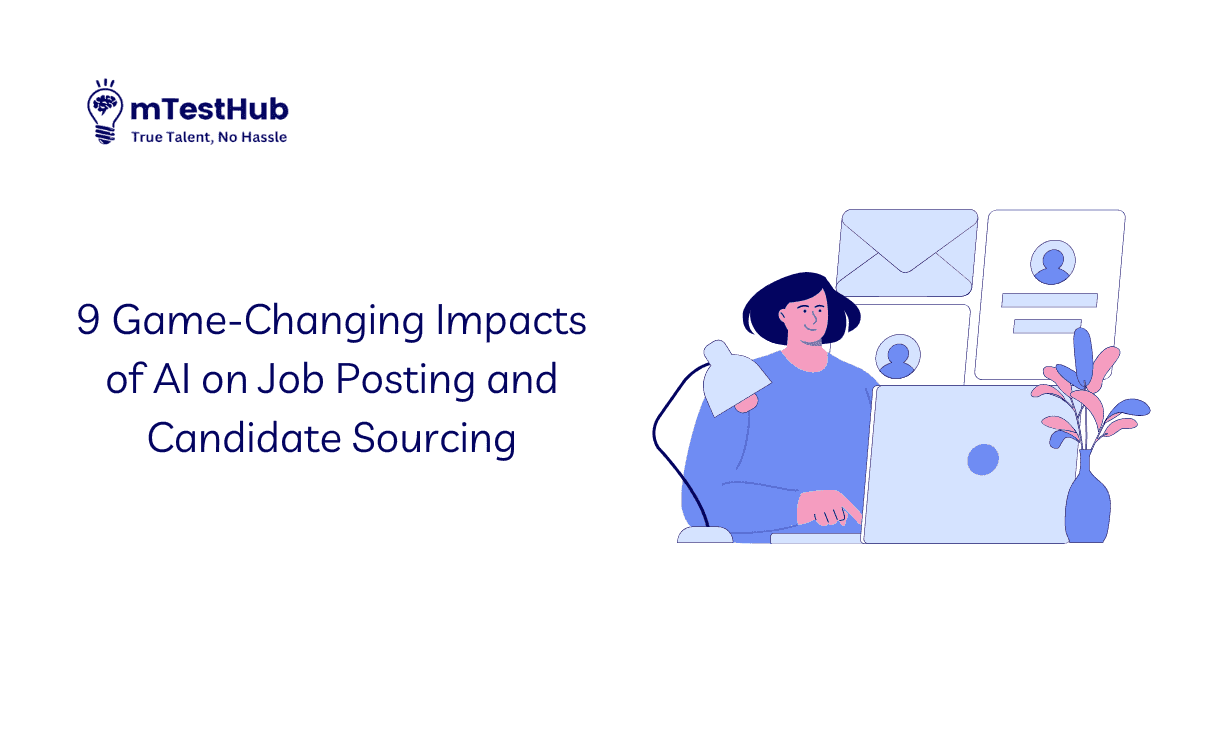This presentation outlines the transformative impact of AI on job posting and candidate sourcing in recruitment. It covers AI's role in automating job descriptions, enhancing candidate targeting, and optimizing SEO.


Product Marketer. MTestHub
Artificial intelligence has been making waves across many industries in recent years and the recruitment space is no exception. In fact, AI is poised to completely change the way employers source, attract, and communicate with qualified job candidates. By leveraging intelligent technologies, companies can revolutionize outdated and inefficient hiring methods, saving time and money. This blog will explore nine major impacts AI is projected to have on two key recruitment stages - job posting and candidate sourcing.
Gone are the days of crafting basic job listings and hoping the right candidates stumble upon them. With AI, employers can create highly strategic and appealing job ads designed to capture attention. Here are three ways intelligent algorithms are transforming job posting:
Automated Job Descriptions - Rather than manually piecing together responsibilities and requirements for open positions, AI tools can instantly generate polished job descriptions from HR records and past role data. These algorithms create postings optimized for both candidate attraction and applying AI throughout the candidate screening process later on.
Targeted Job Advertising - Once an employer posts a job listing, AI marketing algorithms kick in to ensure it reaches the most suitable audience. These intelligent systems analyze demographic and industry data to determine precisely where jobs ads should be placed across various online channels to garner the highest qualified traffic.
Enhanced SEO - To boost visibility, AI algorithms will optimize every job posting for relevant keyword placement, formatting, readability and other on-page SEO best practices. This helps listings appear higher in related candidate searches across major job boards and search engines like Google.
Yet it’s not just about crafting the perfect job listing. Once candidates start applying, AI gives recruiters a significant advantage when screening and identifying top talent in the applicant pool. Here are four ways AI looks to improve upon traditional candidate sourcing techniques:
Intelligent Candidate Screening - By integrating AI systems into their career sites and applicant tracking systems, companies enable technology to automatically scan submitted resumes and surface the most promising applicants for further review. This allows recruiters to focus their efforts only on qualified talent.
Predictive Analytics - Many AI platforms go beyond just resume analysis - using predictive data models, they forecast which candidates have higher likelihood of excelling in a given role based on historical hiring data, ensuring the best fits make it through screening.
AI-Driven Talent Pool Analysis - Employers can upload their entire candidate database into smart AI systems which determine the top existing prospects across the company who are ripe for contact about new openings. This expands the talent pool exponentially.
Personalized Candidate Engagement - Once applicants pass initial screening stages, AI comes into play again to automate and customize communication at scale. From tailored job invites, to responsive chatbot messaging and scheduling interview times, AI handles these repetitive recruitment tasks.
As AI continues permeating the recruitment arena, companies should prepare for technologies to get even smarter and more autonomous when it comes to key hiring functions. Two emerging ways AI looks to continue optimizing processes include:
Bias Reduction - Vendors are working diligently at training algorithms to remove unconscious human bias from the hiring equation as much as possible regarding factors like gender, ethnicity and age. AI should allow companies to build more diverse, equitable workforces.
Continuous Learning - The more hiring cycles AI systems undergo, the more insights they gain to refine decision-making. As algorithms process volumes of applications over time, they will eliminate poor candidates faster while surfaced overlooked qualified talent at exponentially greater rates.
Implementing AI to transform outdated recruitment methods with intelligent job posting strategies, precision candidate targeting, and automated screening represents a monumental opportunity to connect top talent with open roles faster than ever. Early adopters of this game-changing technology will gain significant competitive advantages in building skilled, future-ready workforces.
Be the first to know the latest hiring trends, product updates, and exclusive tips to streamline your recruitment process by joining our newsletter.

Streamlining Recruitment, Assessments, and Exams with AI-driven automation.
We use cookies to improve your experience. By continuing, you consent to their use. Do you accept?